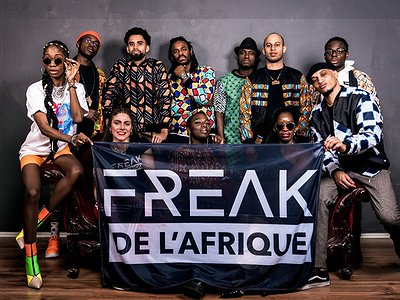Name: Freak de l'Afrique
Members: DJ Nomi, Wallizz, Young Gambinos, Ukai Ndame, DJ Freegah, Piccell, Lukinu, Christon, Roberta
Occupation: Songwriters, instrumentalists, performers
Nationality: Multinational
Recent release: Freak de l'Afrique's Woza is out via Man Recordings.
Recommendations: Lucky Dube’s music,
If you enjoyed this interview with Freak de l'Afrique and would like to find out more about the band, visit their official website. They're also on Instagram, Facebook, and Soundcloud.
When did you start writing/producing/playing music and what or who were your early passions and influences? What was it about music and/or sound that drew you to it?
As a collective we started producing music in 2018 with our first single “Mama Eh”. As DJs we have been playing music since 2012.
For each of us music has always been an important part of our lives. We grew up with Daddy Lumba, Lucky Dube, Fela Kuti, Brenda Fassie, Michael Jackson, etc.
[Read our Made Kuti interview]
Music connects people and gives laughter, happiness, good vibes. Those are the main things that draw us to music.
Some people experience intense emotion when listening to music, others see colours or shapes. What is your own listening experience like and how does it influence your approach to music?
Music is a bodily experience. We need to move. The whole body vibrates and vibes to the melody.
How would you describe your development as an artist in terms of interests and challenges, searching for a personal voice, as well as breakthroughs?
As artists we have grown over time. As we started we weren’t taken seriously. Our genre was side-lined and not mainstream enough. People still had eurocentric images of Africa and African music and with that certain expectations of what our genre is. With time our genre has been accepted and become more mainstream in Germany and we feel like we made a very contribution towards that.
Secondly, as mixed gender collective, especially our artists were confronted with a lot of sexism in the scene. But we focused on our goals and continued on our path and are very successful with the route we have taken.
Tell me a bit about your sense of identity and how it influences both your preferences as a listener and your creativity as an artist, please.
Our afro-diaspora heritage is a central part of our identity as a collective, which is why focus different sub genres of modern African sound.
What, would you say, are the key ideas behind your approach to music and art?
Our approach to music is openness and good sounds.
How would you describe your views on topics like originality and innovation versus perfection and timelessness in music? Are you interested in a “music of the future” or “continuing a tradition”?
Both are very important to us.
Tradition and futuristic and innovative ideas don’t’ clash in our opinion. Both are important and what we strive for.
Over the course of your development, what have been your most important instruments and tools - and what are the most promising strategies for working with them?
Networking and being in constant exchange with other artists and members of our community and the scene has been an important tool that has pushed us to start many projects and try many different things.
Could you describe your creative process on the basis of a piece, live performance or album that's particularly dear to you, please?
“Yebo” is our favourite single on the album.
We knew we wanted an Amapiano track. So we got one of the best producers in Africa, Ellputo, to create a beat with us. We connected with a South African dancer who lives Berlin and together we made magic.
Listening can be both a solitary and a communal activity. Likewise, creating music can be private or collaborative. Can you talk about your preferences in this regard and how these constellations influence creative results?
Both are important and have an influence on our creative results.
How do your work and your creativity relate to the world and what is the role of music in society?
We want to establish the existence and visibility of Afro music in Germany, because it is underrepresented / non-existent.
There seems to be increasing interest in a functional, “rational” and scientific approach to music. How do you see the connection between music and science and what can these two fields reveal about each other?
We use technology to create our music, which is why music and science are central to us.
Creativity can reach many different corners of our lives. Do you feel as though writing or performing a piece of music is inherently different from something like making a great cup of coffee? What do you express through music that you couldn't or wouldn't in more 'mundane' tasks?
Joy.
Music is vibration in the air, captured by our ear drums. From your perspective as a creator and listener, do you have an explanation how it able to transmit such diverse and potentially deep messages?
Music is connected to experiences and memories, which it can trigger.




